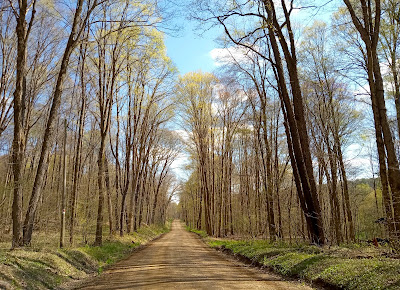Reflections - Crazy Spring
“You won’t need a jacket.” Spence bent to fasten the Velcro straps on his boots for our mid afternoon health walk April 15. “But bring a mask.”
A mask? Wearing a mask while exercising makes me pant after striding a mere ten yards. Nevertheless, I fetched my sunglasses, left my jacket, and slipped an N95 mask over my wrist. The mask wouldn’t make me pant there.
Our feet crunched gravel along dry West Creek Road. Following the flight of the first cabbage white butterfly of the season with my eyes, I narrowly missed stepping on a flattened baby snake curved in a treble clef shape—too smashed to know which type.
An engine revved and a cloud of dust appeared over the next rise.
“Put on your mask.” Whipping a black N95 out of his pocket, Spence covered his mouth and nose.
I hustled to attach a white mask to my face.
Out of the cloud raced a full-size pickup. It zoomed past us, raising dust twice as high as the black truck that would be dusty gray before it got to the hard road.
“Must be a stranger,” Spence muttered.
We paced side by side through the cloud. I breathed the pocket of fresh air my mask provided—no panting, just leisurely enjoying our walk. I batted my eyelids several times, though, before the dust finally settled. Spence slipped his mask into his pocket. I slid mine comfortably over my left ear and concentrated on flowers.
Spring beauties and coltsfoot dominated the roadsides. Trout lilies, violets, and cut-leaved toothwort bloomed too. The flowers attracted the first bumblebee. The hum of an engine joined the bumblebee’s buzz.
We prepared.
Faced with masked pedestrians, the driver of a blue sedan, presumably a local, slowed to a crawl. We exchanged waves. Dust rose to the car’s trunk height.
We still needed the masks.
Woodpeckers hammered trees and peepers sang joyous songs in the wetlands at the bottom of the hill near low-running Deer Creek.
Spence poked me in the ribs with his elbow and pointed to the tree branches sporting teensy-tiny leaves. “I expected larger leaves by now.”
“Probably the trees didn’t get enough rain.” I pursed my lips remembering the blueberry crop I’d lost last spring because of the drought when the berries needed to ripen.
This April lacked showers. Weather forecasters disseminated wildfire warnings for our area. Summer road dust rose months early. Call it climate change, climate craziness, or climate confusion.
Confused is how a pair of robins looked a few mornings later. They hopped in the lush spring-green grass outside the bedroom window in welcome rain. With plump, shiny red breasts and their yellow eyes alert, they hunted for early worms. The robin closest to me cocked its head listening only to get pelted by an ice drop. As the rain changed to an icy barrage, both birds stood marble-statue still. No worms or bugs ventured out into nature's wild swing of temperatures that morning. The robins had my sympathies, but they were healthy. They could adapt and face more extremes than snow after high seventy degree temperatures.
And the robins didn’t have long to chill. In two days, the afternoon temperature soared to the low eighties. Despite a starry night sky and our low valley homestead giving us a brisk Friday, April 21 morning, I couldn’t resist the sunshine pouring onto the deck. I bundled: crochet headband, thick fleece sweatshirt, velour yoga pants, yoga gloves, and gripper socks. Lugging my gear from the loft to the deck two months earlier than normal, I spread my mat beside multi-colored pansies, a red azalea, and a dogwood waiting for transplanting.
 |
| Pansy 3 |
With Adriene coaching over the iPad at the top of the mat, I inhaled the fresh morning air and stretched for the sky. Ande stretched as high as his paws could reach on the other side of the glass door beside me. We lowered to the ground in forward bends together—me exhaling with a swoosh, Ande landing in his food bowl and scattering cat crunchies over the tile floor.
Three morbid owlet moths clung to the adjacent glass door. Dew drops on their folded wings sparkled in the sunshine. How long would they stay motionless as the sun and heat rose? Adriene kept me moving from plank pose to downward facing dog. A fourth morbid owlet moth wibble-wobbled across the computer’s mini keyboard and onto my mat.
Had the unusual April heat confused the moths? A deck wasn't the best place for them to linger, especially since Spence continued to put out sunflower seeds each morning, and the scolding chickadees, with the downy woodpecker that joined their feeding group, would swoop in as soon as I left.
Planning to do yoga outside again the next morning, I stuffed the yoga gear under the bedroom desk and headed for breakfast. Afterwards, I checked on the moths. Gone—hopefully without the downy's help.
The following day dawned rainy and with an air temperature in the low forties. Disappointed, I lugged my yoga gear back to the loft and chided myself for thinking I could stretch regularly outside in such a crazy spring.
This past week, clouds and rain brought a more recognizable April—not considering the wild winds associated with the month of March. While I washed breakfast dishes, a sleek pair of robins hop-skippity-hopped between closed dandelion flowers in the wet grass. They cocked their heads and pulled up one wriggling earthworm after another.
Wearing boots and jackets, Spence and I squished muddy West Creek Road for our health walk. Rain pattered our umbrellas. Scent of earthworms floated in the air. No need to slip on an N95 mask when the lone vehicle swished past.
Spring finished April wearing its rubbers. What spring does in May I don’t want to wager.
Spring on West Creek Road







